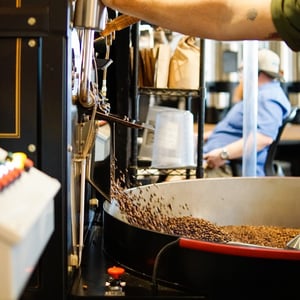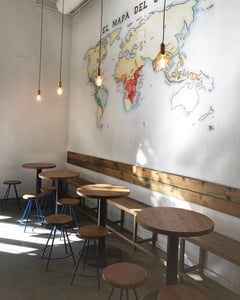How Coffee Shop Owners are Coping with the Crisis - COVID-19 Interviews Part II
12 minute read | written by SOVDA
TABLE OF CONTENTS
In the midst of the coronavirus pandemic, Sovda continues to follow the different stories of coffee shop owners and roasters all over the world. As these stories unfold, it is becoming increasingly apparent that the specialty food and beverage industry has taken some of the hardest economic hits.
Today we share unique perspectives from some of our current and future demo site partners located in Staffelsee in Germany, Cebu in the Philippines, and Oslo in Norway. By sharing these stories with you, we hope that you feel a sense of connection and hope.

Based in Oslo, Norway, Tim Wendelboe is the owner of a coffee shop, micro roastery, and training center named after him. He is the 2004 World Barista champion, 2005 World Cup tasting champion and probably one of the most famous roasters in the world.
The coronavirus has greatly impacted his business as they had to take drastic measures such as closing down “espresso bar and store for a period” and “only being open 2 days a week selling whole beans and equipment.” As a result, their “wholesale business more or less disappeared overnight” and the amount of coffee they are roasting has decreased “about thirty-five to forty percent.” However, they are coping by taking advantage of “online sales”, in addition to “some wholesale clients that are still ordering coffee.”
Unfortunately, Tim says that most of his team “has been on temporary leave so it is quite devastating not being able to keep all of them working.” However, Norway provides coverage for “full salaries the first 4 weeks” and even after that they will continue to “get support from our welfare system.” In order to follow proper social distancing orders, Tim and most of his administration are “working from home.” Their main focus has been a new website launch to “make it easier for people to order online [and] fix bugs in our system.”
He praises his team by saying that “they have been very understanding, flexible and patient”, and are actively working to “make sure the company runs well and survives this hard period.” Remaining optimistic, Tim says that his business has “had a very good year last year” as a result of “the hard work of our team, so we do have a small buffer to lean on in this period and I think we will be able to get everyone back to work hopefully over summer.”
In order to take advantage of the current circumstances, Tim and his team have been working hard to partner with a “a local company” and is planning to be “a part of their new local home delivery platform in the next months.” This means that local customers “can get our coffee beans delivered to your doorstep within 2 hours if you live in Oslo.”

Tim says that the best way for local consumers to support their favorite coffee shops is to “make sure you visit and buy their services as much as you can not only now but also after the restrictions are over.” In short, “stay loyal to your favorite places.”
In closing, Tim reflects on the future of the coffee industry: “I know that people still drink coffee, so I am quite optimistic.” He foresees that “2020 will be a year where we are not making profits and “sales will suffer a bit”, however he “will be working hard in order to make sure that we take care of our coffee producing partners so that we are able to get their high quality coffee in the coming years.”

Thomas was the first Q grader in Germany and founded his roastery in 2008 and also owns a café in Bavaria, Germany.
This crisis has greatly affected their country, and local businesses, as Thomas recounts how there was a “shortage of orders” at first when everything shut down.
As the weeks have progressed, Murnauer has come up with their own unique solutions for keeping their business alive. Thomas says that their café has been contacted by different markets in Germany to purchase their coffee wholesale and sell their products on shelves: “apart from toilet paper, people are purchasing a lot of coffee.” Since people want to make the most of their days in quarantine, Thomas has seen a spike in the number of specialty food and drink purchases. As a result, Murnauer has been able to keep their business afloat and even expand their customer base.
Germany’s solution for keeping people financially stable (even if they cannot work right now) is providing them 60% of their salary regardless. However, for some this proves to be difficult. Specifically, at Murnauer, salesmen can live off of these wages, while baristas cannot. In order to provide relief, Thomas has his staff “start[ing] to work in two different shifts. These shifts are split by time and working space” so that his team can keep consistent hours. For example, he has “two types of roasters, one stays at home while the other is at the roastery” and they switch on and off in order to keep the business running while abiding by social distancing protocols. He emphasized that “we are thankful to all our staff members” including those “who work more than before and also to [those who choose] to stay at home.”
Thomas’ advice to those who want to help keep small businesses up and running is to “stay local and really think about where your food and drink is coming from.” Instead of directing people to their café, Thomas is planning to release a social media campaign, redirecting customers to buy their coffee at local markets instead. That way, it’s “mutually beneficial for Murnauer and the markets.” Another idea that Thomas wants to implement is sending “owners of local offices home with coffee to send out to their employees since they can’t have coffee in the office every day.”
One other approach that Murnauer has implemented to adapt to the pandemic is delivering coffee via bike. They now provide door-to-door service this way, reinforcing the personal connection that they have with their customers. Thomas says it is their top priority to give great customer service: “[they] are so happy to see a person ringing the doorbell and see their coffee delivered.”

Thomas noted that in Germany, there are “a lot of coffee businesses coming into the market...and it’s important that their online presence is established. These younger, smaller businesses with just a coffee bar and roaster will begin to go out of business.” This is why it is so important that we, as consumers, pay attention to our daily purchases and are mindful about the way that we support our communities. A word of advice from Thomas is to keep in mind that “every person can be a part in changing the world in the way they act.”

Gio won the Philippine Brewer Cup Competition 2020 last month and owns a café and roastery called The Good Coffee Cup Co in Cebu. He says that the curve of the virus is starting to flatten, but that they are still taking necessary precautions. When it first started, Gio noticed that “our wholesale, our roastery, and distribution” sales started to “slow down.”
In regards to relief efforts for his team, Gio says that all sales, administration, and marketing staff are “working from home.” For the staff that do have to be physically present to keep the business operating, every business in the Philippines has to start “scanning temperatures” before employees can start their day. In order to reinforce sanitary measures, Gio makes sure that before anyone enters the shop that the staff “sprays alcohol...which has helped [maintain] the confidence” of staff members who are nervous. Since public transportation has shut down, Gio has implemented a plan for alternative methods of transportation for his employees who need it: “Some are picked up and dropped off. Some are given bicycles...we want them to feel like we are looking after them.”

At first, their solution to this problem was to implement “takeout and delivery before the virus started to spread.” However, as concern started to spread, The Good Coffee Cup “migrated operations online” so that the café could focus on “online selling.” As people started to settle into quarantine, more online orders were being placed. Gio noticed that sales started to spike in “March and April” which were “stronger than other months because we were starting to cover a bigger market outside of the café.”
Aside from buying online, Gio mentioned that the best way for consumers to support locally owned businesses during this time is to “share your experience with the particular business or cafe.” This creates a chain reaction where consumers are encouraging others to purchase from these small businesses which “helps sustain [them] long-term” and “helps build customer trust.” Some practical ways of applying this is by “leaving reviews” or in The Good Coffee Cup’s case, they hand out “a note with a QR code that redirects the customer to a review page.”
Gio predicts that in the “next six months people will be staying at home” regardless of whether the curve has flattened. His solution for this is empathetically thinking through the customer experience by asking questions like “how can invest in and best serve” these people. He also thinks that roasters in the Philippines are going to experience “a tough ride...especially in this season” especially because their country ranks highest “for instant coffee consumers in the world” so roasting volume may decrease.
One thing that The Good Coffee Cup has done to extend gratitude to their community is “pledge support to the front-liners or health workers” by providing free coffee “all throughout the week...and were able to give out three thousand five hundred cups of coffee” to those who are saving lives.

We at Sovda want to express our gratitude to these wonderful cafés and roasters who have been willing to honestly communicate about their stories with us. Included are links to their online shops so that you too can support their businesses wherever you are in the world.
Latest blog posts
Visit the blog
How Coffee Companies are Adapting in the Crisis – COVID-19 Interviews Pt. III
In our final pandemic series article, Sovda follows the stories of coffee shop owners and roasters around the world. As you know, during ...

How Coffee Shops Around the World are Navigating a Crisis - Part I
News about Coronavirus, or COVID-19, has taken the world by storm. Businesses all over the world have been affected due to the rapid ...
Better coffee awaits
Chat with our team to learn more about what SOVDA can do for you. Whether you want to refine your production or grow your business, we can help. Get in touch to perfect your roastery.